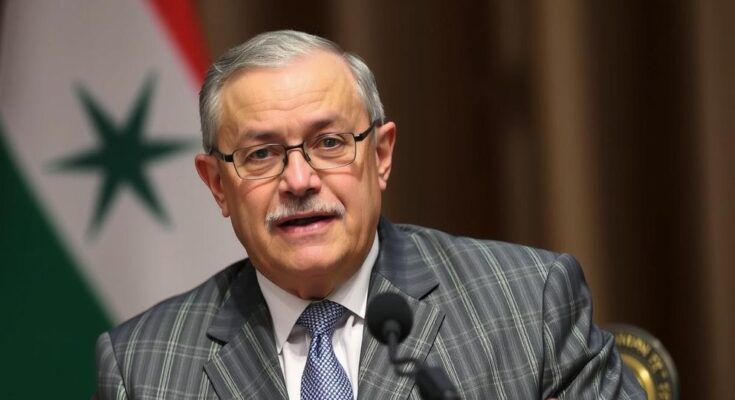Syria’s new leader, Ahmed al-Sharaa, stated that organizing elections could take up to four years and drafting a new constitution could take three years. He expressed hopes for significant changes within a year and announced plans for dissolving the HTS at a national dialogue conference. Sharaa emphasized building a moderate government while managing relationships with foreign powers like Russia and the United States.
Ahmed al-Sharaa, the newly installed leader in Syria, indicated that organizing elections may require up to four years, while drafting a new constitution could take three years. In his recent interview with Saudi state media, Sharaa expressed optimism that significant changes might manifest within a year following the overthrow of President Bashar al-Assad. His statements mark the first comments regarding the electoral timeline after the regime change.
Sharaa, who leads the Hayat Tahrir al-Sham (HTS) group responsible for removing Assad, conveyed intentions to shift the government away from its prior Islamist affiliations. The HTS previously had links to extremist groups, but the leadership now aims to project a more moderate image, promising to safeguard minority rights amid fears of potential Islamist governance. Furthermore, Sharaa stated that HTS would be dissolved at a national dialogue conference to support a more inclusive political framework.
The recent developments have stirred considerable speculation about Syria’s future, particularly concerning its relationship with foreign powers such as Russia, which has maintained a substantial military presence in the country throughout the civil war. Sharaa emphasized shared strategic interests with Russia and anticipated discussions on the terms of military base operations with Russian officials. Moreover, in light of changing U.S. administrations, he expressed hope for an easing of sanctions against Syria, indicating a desire for improved relations with the United States.
The context surrounding Syria’s current political landscape revolves around the recent ousting of President Bashar al-Assad after a protracted civil conflict lasting over a decade. This change has led to significant shifts in governance, with the leadership now under the control of the HTS, which previously adhered to a militant Islamic ideology. As Syria navigates its recovery and political restructuring, the questions of electoral processes and constitutional reforms have emerged as fundamental challenges. The new leadership’s ability to establish a functioning government that respects diverse ethnic and religious groups remains a critical focal point in diplomatic discussions, particularly concerning relations with foreign powers entwined in the conflict.
In conclusion, Ahmed al-Sharaa’s remarks indicate that Syria is embarking on a lengthy process of political restructuring following the regime change from Bashar al-Assad’s rule. While elections may take up to four years and constitutional drafting could span three years, there is a commitment to safeguard minority rights and foster a less extremist governance approach. The geopolitical dynamics with Russia and the potential impacts of U.S. foreign policy further complicate the transitional period, yet optimism for moderate governance persists within the leadership’s public statements.
Original Source: www.france24.com




